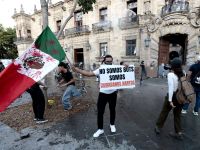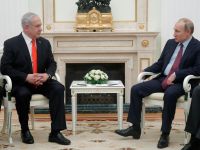More than 300 people from three continents kicked off a three-day meeting here late Monday aimed at charting the road to peace for violence-wracked Colombia.
The meeting brings together representatives of the Colombian government, civil society, and its largest leftist rebel groups, the Revolutionary Armed Forces of Colombia (FARC) and the National Liberation Army (ELN).
Participants also include delegates from the United States, the European Union and Latin American countries, according to Peace Colombia, which organized the event being held at a hotel 16 kilometers (10 miles) northeast of here.
The International Conference on Peace and Human Rights in Colombia will continue through Wednesday amid tight security and behind closed doors at a hotel on the outskirts of the Costa Rican capital, the group said.
"Our interest is to involve the international community and Colombian civil society as much as possible, to press for a negotiated solution" to violence that threatens to turn Colombia into "another Kosovo," said Marcos Romero, a spokesman for the group.
High on the agenda is the controversial 7.5-billion-dollar initiative of Colombian President Andres Pastrana to stamp out the drug trade and promote economic development. The United States has contributed 1.3 billion dollars to the plan.
Supporters of Plan Colombia, as Pastrana's initiative is known, say it will help end Colombia's decades-long civil war because both right-wing paramilitaries and leftist rebels derive income from the drug trade.
But rebels and civic groups argue that Plan Colombia uses a military approach and will increase violence in Colombia.
"Eighty percent of the US funds are destined for the purchase of helicopters and weapons, and only 20 percent for social programs," Romero said.
In his opening speech, ELN commander Ramiro Vargas rejected the initiative, calling it a "plan for war."
"We want to work for peace, but not a fake peace designed to preserve existing privileges and oppression," said Vargas. "Plan Colombia is a counterinsurgency plan."
Colombian Development Minister Augusto Ramirez told the meeting his government was ready to sign an agreement that would bind government and rebel forces to respect human rights in their confrontation.
Ramirez said "drug trafficking fuels the armed conflict," and called on the ELN and FARC to further their peace negotiations with the government and form an alliance to stamp out the drug trade.
Neither Vargas nor Ramirez responded to a call made earlier by Peace Colombia for a 100-day truce in government-rebel fighting and a delay in the implementation of Plan Colombia to bolster the peace process.
Colombia's neighbors are also worried that the effects of escalating violence will be felt outside Colombia's borders -- and that appears to be occurring already, although Plan Colombia has yet to go into effect.
Panama's President Mireya Moscoso said the country is to tighten security on its border with Colombia after an attack Sunday by gunmen in eastern Darien province left one girl dead and 12 people wounded.
Some 1,000 Colombians fled to Ecuador last month due to fierce clashes between FARC fighters and paramilitary groups in Putumayo province, Ecuadoran officials said.
And Colombia and Venezuela exchanged testy words this weekend after Colombia accused Venezuela of sending military helicopters across the border to eradicate coca crops -- a charge Venezuela denied.
In Bogota Monday, Colombia's Defense Minister Luis Ramirez stressed that the drug trade and the violence that accompanies it are transnational problems.
"As long as the United States consumes more than 300 tonnes of cocaine a year, and Europe consumes 200 tonnes, and as long as these developed countries do not control the flow of arms and chemical precursors (for drug production), there will be violence in Colombia," Ramirez said.
"Consumer nations must realize that they too are responsible for the violence that exists here," he said, speaking at a news conference.
The Costa Rican conference coincides with a biennial summit of defense ministers from across the Americas, including the United States and Canada, who gathered in Manaus, northern Brazil, for the opening of the summit Tuesday -- SAN JOSE (AFP)
© 2000 Al Bawaba (www.albawaba.com)







